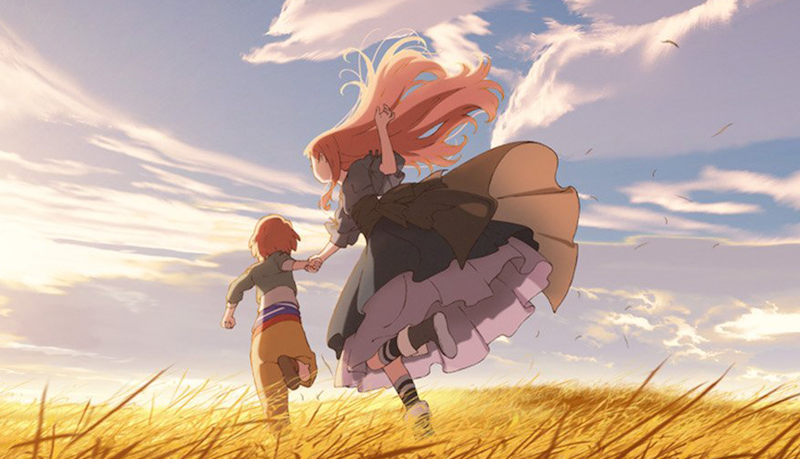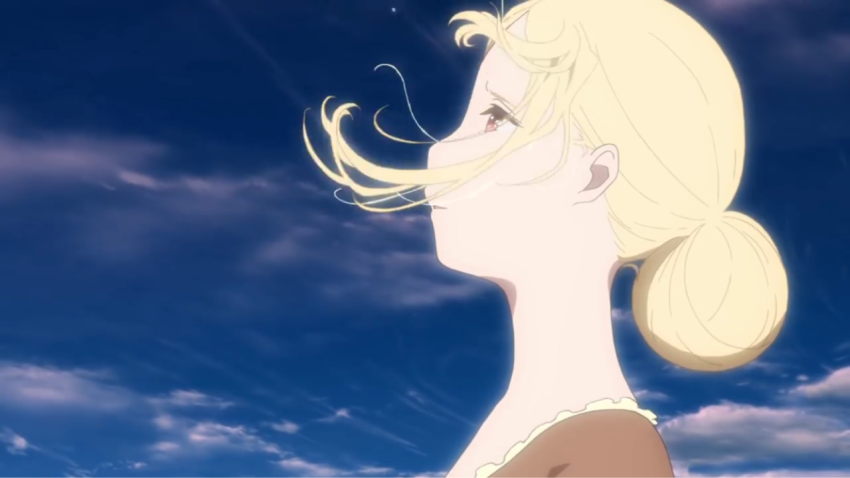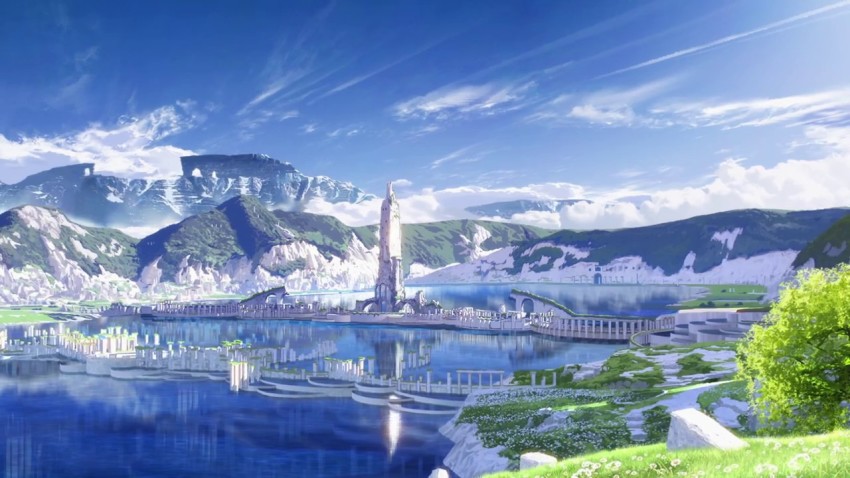Maquia
May 29, 2019 · 0 comments
By Jonathan Clements.
 Maquia weaves at her loom; she dyes the Hibiol cloth; she hangs the sheets to dry in the tall halls of her people, the elfin Iolf race. She’s not as assertive or brave as Leilia, the girl she idolises, but that probably explains why Leilia, not her, has attracted the attention of Clear, a local boy. Maquia watches them in a secret midnight tryst, lit by the firefly-like pollen of magical flowers, and wishes for such a life for herself.
Maquia weaves at her loom; she dyes the Hibiol cloth; she hangs the sheets to dry in the tall halls of her people, the elfin Iolf race. She’s not as assertive or brave as Leilia, the girl she idolises, but that probably explains why Leilia, not her, has attracted the attention of Clear, a local boy. Maquia watches them in a secret midnight tryst, lit by the firefly-like pollen of magical flowers, and wishes for such a life for herself.
Instead, she is whisked away from everything she holds dear. Dragon-riding bandits attack her village, intent on dragging away the women. Legend has it that Iolf girls never age, making them valuable prizes. But Maquia escapes the fate of her fellow villagers, dragged into the sky on a rogue dragon and dumped in a faraway forest with no friends.
Maquia has been warned about the outside world. There is a price for the Iolf’s immortality, and it is that they are forbidden from finding love in the outside world. Instead, they are supposed to stay at their looms all their lives, weaving the Hibiol (“Cloth of Days”) a fabric that preserves memories. When Maquia finds an orphaned baby, however, she is unable to leave it to die. She takes him into her care, naming him Erial, and tries to raise him herself, initially untroubled by the fact that he will age at a human rate, whereas she never will.
We’ve been here before. This is the forbidden love of The Little Mermaid and the time abyss of the Japanese folktale Urashima Taro. However, Mari Okada’s directorial debut, Maquia: When the Promised Flower Blooms, confounds the expectations of its audience by focussing not on romance, but on a different kind of love. In a throwaway scene on a rainy night, Maquia says the same words to Erial that Andy’s mother says to her grown-up little boy in the tear-jerking Toy Story 3 – “I wish you could stay like this forever.”
Stealing a page from the playbook of the original Highlander, writer-director Okada speeds us along with a montage to show the passing of the years, dotting the story with premonitions of what is to come. Children’s voice-actors are switched for adults; the family pet is no longer so swift on its feet. Time passes at different rates for different species, and it is doomed to pass slowest of all for Maquia. Meanwhile, the big story in the human world, a plague upon the dragon-like renato lizards that form the front line of the kingdom’s military might, has taken years to take hold, but for the viewer, it passes in mere moments.
 Director and screenwriter Mari Okada (b.1976) is a poster girl for Japan’s Millennials, having taken a deeply unorthodox career path. A child of divorce and a notorious truant from high school, the plainly angry young woman was thrown a lifeline by teachers who offered to set her reading assignments and increased homework to offset her no-shows in class. It was a distinctly odd remedy, entirely unexpected in an education system that is notorious for lacking in empathy for unorthodox students. But it seemed to work, pushing her to finish high school and head off to Tokyo to study at a vocational school for computer games.
Director and screenwriter Mari Okada (b.1976) is a poster girl for Japan’s Millennials, having taken a deeply unorthodox career path. A child of divorce and a notorious truant from high school, the plainly angry young woman was thrown a lifeline by teachers who offered to set her reading assignments and increased homework to offset her no-shows in class. It was a distinctly odd remedy, entirely unexpected in an education system that is notorious for lacking in empathy for unorthodox students. But it seemed to work, pushing her to finish high school and head off to Tokyo to study at a vocational school for computer games.
There, she honed her love of scriptwriting, seizing any opportunities to write professionally, be it adult videos, game scripts, CD dramas or manga. In 1998, aged 22, she worked on the anime DT Eightron, hired as a touch-typist to take dictation from show-runner Hideki Kakinuma, and soon pitching her own story ideas. By 2001, she was working for the director Tetsuro Amino on Angel Tales. Challenged by him to write something based on her personal experience, she pitched The World Outside, which dramatised her own troubled teens, her social anxiety, her withdrawal from the school where she was bullied, and her embittered, antagonistic relationship with her mother. Although the script was never made, Okada has since commented that it was Amino’s faith in her that prompted her to seriously consider an authorial career. A decade after she put The World Outside in a drawer, rereading it would inspire to write Hanasaku Iroha (The Blooming Colours), which was a much more nuanced portrayal of a single parent struggling to raise a difficult daughter. Her own mother, however, didn’t see the resemblance, and commented only that the character looked like ”a mess.”
Okada’s ongoing appreciation of what her own mother must have gone through, abandoned with a three-year-old child, seems to inform much of Maquia’s problems in the early part of this film. Our heroine has been literally yanked out of her comfort zone and transported to a strange country, where she finds herself becoming the adoptive mother of a helpless infant. “A loner has found another loner,” archly comments one observer.
 Okada has become one of the most prolific screenwriters in modern anime, not only contributing scripts to shows such as the new Lupin III and Fractale, but writing entire seasons of Canaan, AKB0048 and Wandering Son, among others, and creating the fan favourite Anohana: The Flower we Saw that Day. She has also published a memoir outlining the journey she took from a withdrawn teenage shut-in to the successful author of much-loved anime like Anthem of the Heart. It was Anohana, however, that really made her name, submitted to a writing competition, and drawing directly on her years as a teenage truant. Released as a novel, anime, manga, game and live-action film, it looked back upon a scattered group of former middle-school friends, reunited in their late teens by the ghost of a dead classmate. Over Okada’s initial objections, the production team even decided to set it in her real-life home town of Chichibu, and photographed her childhood home as artistic reference.
Okada has become one of the most prolific screenwriters in modern anime, not only contributing scripts to shows such as the new Lupin III and Fractale, but writing entire seasons of Canaan, AKB0048 and Wandering Son, among others, and creating the fan favourite Anohana: The Flower we Saw that Day. She has also published a memoir outlining the journey she took from a withdrawn teenage shut-in to the successful author of much-loved anime like Anthem of the Heart. It was Anohana, however, that really made her name, submitted to a writing competition, and drawing directly on her years as a teenage truant. Released as a novel, anime, manga, game and live-action film, it looked back upon a scattered group of former middle-school friends, reunited in their late teens by the ghost of a dead classmate. Over Okada’s initial objections, the production team even decided to set it in her real-life home town of Chichibu, and photographed her childhood home as artistic reference.
Her career has spanned the “Lost Decades” in which Japan has stumbled to regain its footing after an economic slump. It has hence made her an attractive icon for many of the country’s slackers and NEETs – when the job market is depressed and prospects are limited, there is a heart-warming message to be found in the story of a girl who drops out and then fashions a career for herself in modern media. One can’t help but wonder, however, if the public narrative of Okada’s rags-to-riches story concentrates on the wrong elements. As is plain to see by simply looking over her CV, she got where she is today through a driven pursuit of her writing passions, and a hard-nosed assault on every available working opportunity. Okada’s success is not a signal for every anime fan to drop out of school… although it might be a message for teachers the world over to find and encourage whatever it is that truly fires their pupils’ interests.
Her prominence in the closed world of otaku-friendly anime has also put her at the sharp end of online trolling – she was troubled early in her career by death threats from fans of the original Angel Tales, leading to weight loss that she later jokingly called her “Misery Diet.” It’s unfortunate that some members of Japan’s otaku tribe should have chosen to turn on someone who was so clearly one of them, but Okada has spoken in interviews of her resolve to shut out the din of social media and concentrate on the feedback from her professional colleagues, not resentful fanboys carping from their bedrooms.
 Maquia is notable for its use of lighting – the searing glare of the sun on a lake and bright stone, the translucence not only of rays of light through diaphanous gowns and hanging tapestries, but through vitreous porcelain. The design of this film is in love with light itself, and indeed its absence, framing many shots in selective shadow, accentuating the artistry of the animators by obscuring their best work and then revealing it again in flashes. Okada’s direction constantly reminds us that bright light can blind or throw truly dark shadows, creating chiaroscuro effects in great Iolf weaving halls or dark country cottages. Most notably, it allegorises Leilia’s sense of imprisonment – the bright, clear sky is visible overhead, but only in frames crowded out by shadowy alley walls and overhanging eaves.
Maquia is notable for its use of lighting – the searing glare of the sun on a lake and bright stone, the translucence not only of rays of light through diaphanous gowns and hanging tapestries, but through vitreous porcelain. The design of this film is in love with light itself, and indeed its absence, framing many shots in selective shadow, accentuating the artistry of the animators by obscuring their best work and then revealing it again in flashes. Okada’s direction constantly reminds us that bright light can blind or throw truly dark shadows, creating chiaroscuro effects in great Iolf weaving halls or dark country cottages. Most notably, it allegorises Leilia’s sense of imprisonment – the bright, clear sky is visible overhead, but only in frames crowded out by shadowy alley walls and overhanging eaves.
Maquia has been billed in Japan as the first 100% Okada production – the first time that the creator has achieved hyphenate status, and is in full control of what is done with her work. Here she is neither a worker-for-hire on someone else’s franchise, nor a show-runner answering to a creator, nor that creator herself, arguing with the show-runner. Instead, she is literally calling the shots, which can lead to some quirky decisions. Animation is a zero-sum game – something’s got to give – and her long, loving appreciations of light and shadow come at an odd price. Certain shots, which one can easily imagine as expensive beauty passes in the hands of other directors – a tall ship in full sail, for example, or a dragon in flight – seem to have been bashed out with the kind of cavalier attitude that is usually reserved for faceless crowd scenes. But this itself is part of the Okada mystique – animation is all about what gets left out, and her priorities are clearly a world away from those of her colleagues and rivals.
The journey taken by Okada’s characters rushes through the years with the speed of time-lapse photography.. As the boys who were once her equals grow into men, Maquia starts to take on the appearance of one of anime’s great icons – the Gunbuster heroine Noriko Takaya, who remained permanently teenage while the world aged around her. When we are thrown into a revolutionary conspiracy in the kingdom of Mesate, it happens so fast that the viewer gets whiplash. Another director would have spent five minutes establishing cast and motive; Okada bins all that and takes us straight to the plotting rebels.
Most conspicuously, any conservative, focus-grouped writer or director would have immediately zoomed in on a different set of characters. The traditional story to be found in Maquia is not Maquia’s at all, but that of Clear’s thwarted love for Leilia, and his desire to rescue his betrothed from the aristocrat who has kidnapped her. There’s plainly a lot going on in the several years’ backstory of Leila and her suitor, Prince Hazel, but we just skip through that in mere seconds. As for Leilia, trapped in a gilded royal cage, there are strong, (perhaps accidental) resonances of Masako Owada, Crown Princess of Japan, who has famously struggled with depression in the stifling environment of the imperial household, but who will be crowned Empress in 2019.
Although there are moments of traditional combat, and a well-observed knight slipping in the very gore he has created, this is largely not the warrior’s-eye view of Berserk. Fight scenes are often shot from a distance, as if watched by women and children who are sure to suffer, whatever the outcome. Struggles on a battlefield are pointedly intercut with the agonies of a woman giving birth, and when the battle is over, there is no god’s-eye view of who has won the day. It’s not even initially clear, as the survivors pick through the aftermath, who has the upper hand – Okada, in fact, seems to regard the political struggles of her world with complete indifference, even though they would surely form the central narrative of such a story if it were directed by a man. She looks for a different kind of hero. Her characters find slavery in victory, and freedom in defeat.
Jonathan Clements is the author of Anime: A History.
Maquia: When the Promised Flower Blooms is released on Blu-ray/DVD in the UK by Anime Ltd.
Leave a Reply